Grammar:Nouns[上下学期通用]
文档属性
| 名称 | Grammar:Nouns[上下学期通用] |
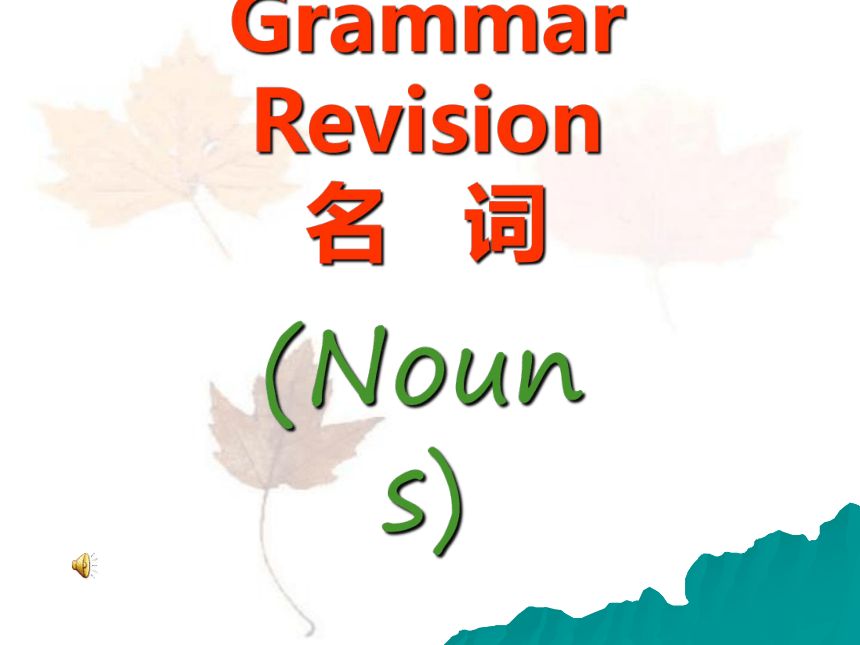
|
|
| 格式 | rar | ||
| 文件大小 | 51.7KB | ||
| 资源类型 | 教案 | ||
| 版本资源 | 通用版 | ||
| 科目 | 英语 | ||
| 更新时间 | 2007-01-12 00:00:00 | ||
图片预览

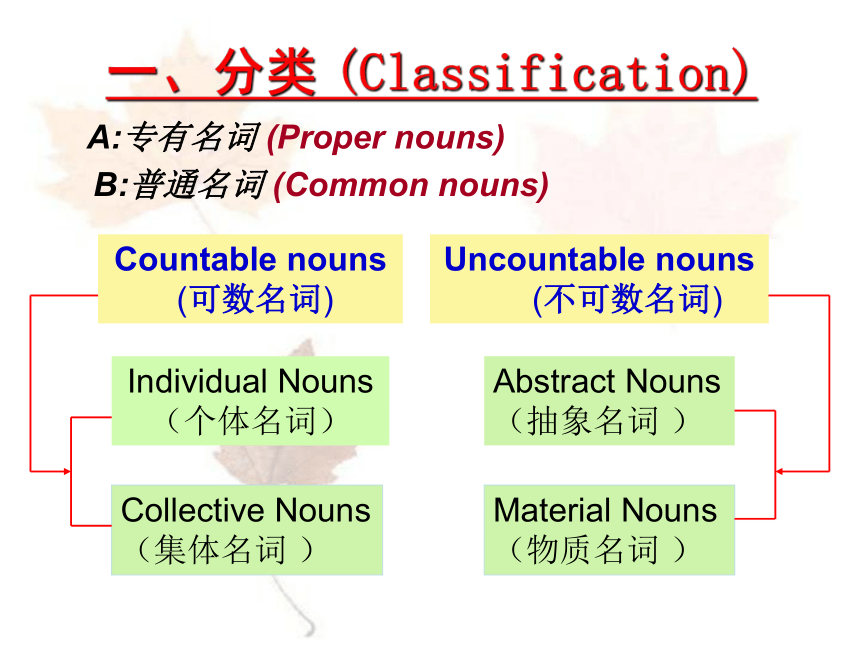
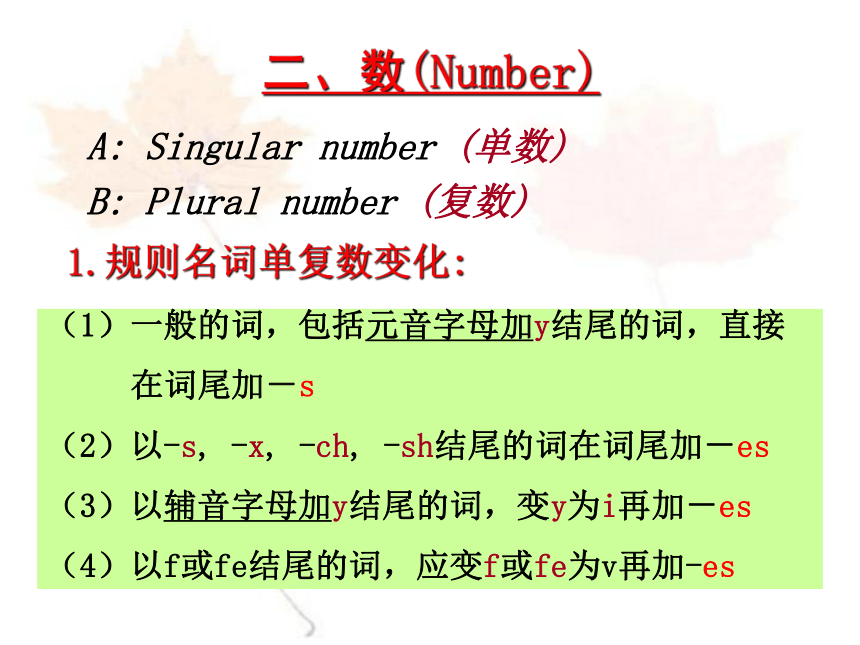
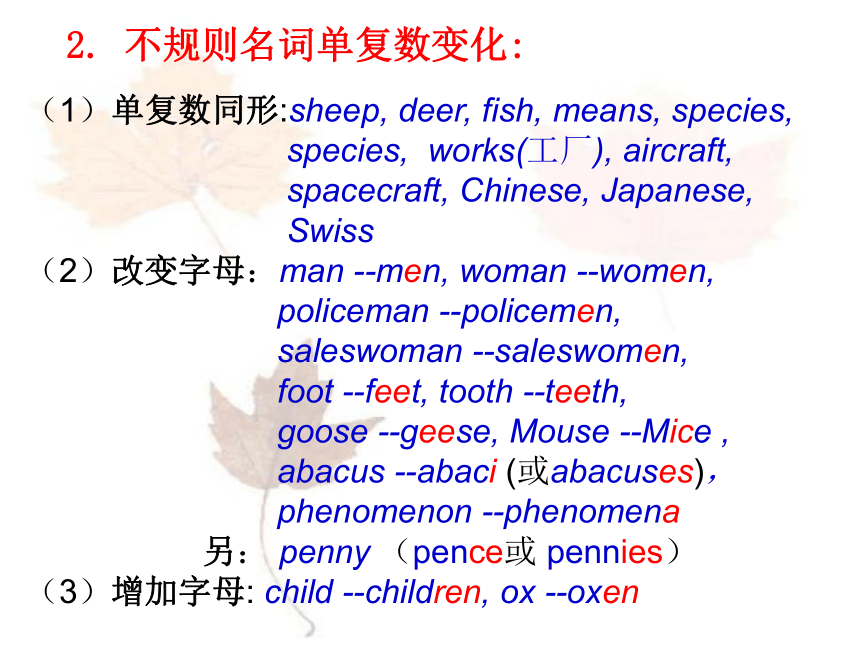
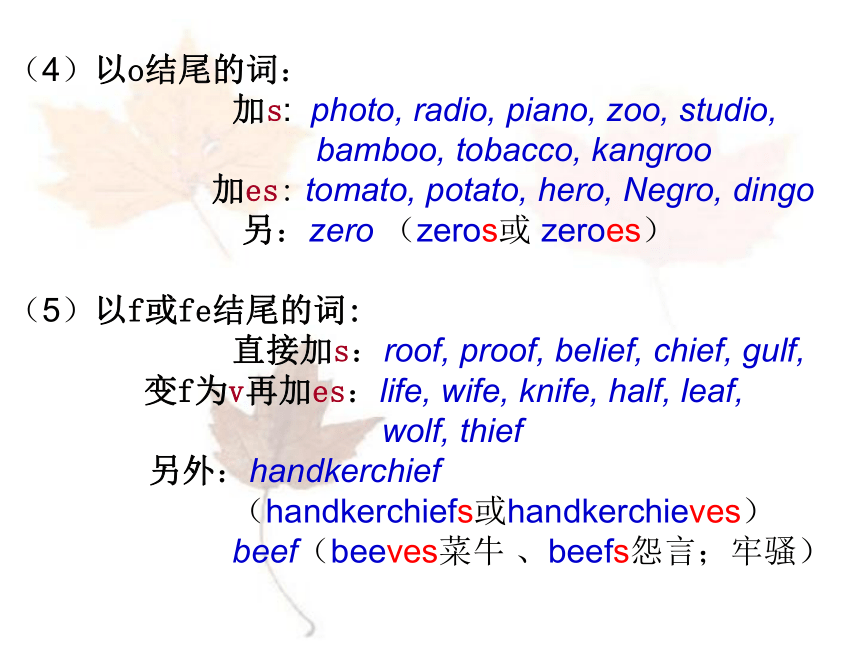
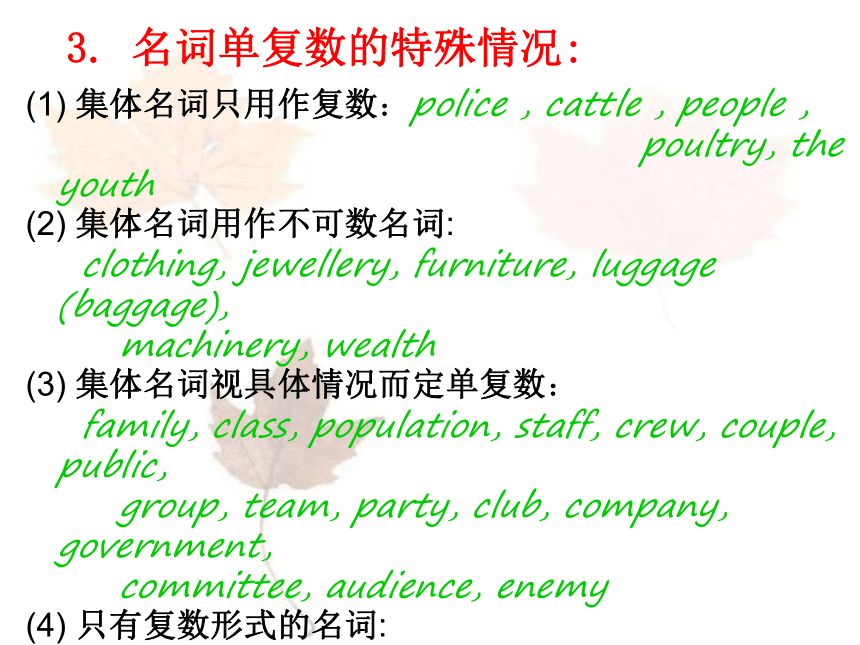
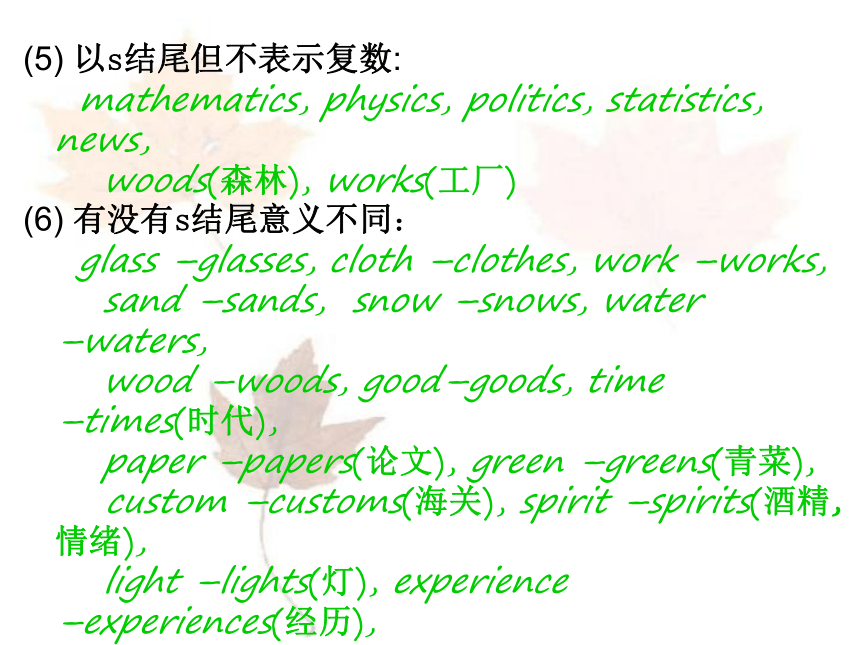
文档简介
课件16张PPT。Grammar Revision
名 词(Nouns)一、分类 (Classification)A:专有名词 (Proper nouns)B:普通名词 (Common nouns)Countable nouns
(可数名词)Uncountable nouns
(不可数名词)Individual Nouns
(个体名词) Collective Nouns
(集体名词 )Abstract Nouns
(抽象名词 )Material Nouns
(物质名词 )二、数(Number)A: Singular number (单数)
B: Plural number (复数) (1)一般的词,包括元音字母加y结尾的词,直接
在词尾加-s
(2)以-s, -x, -ch, -sh结尾的词在词尾加-es
(3)以辅音字母加y结尾的词,变y为i再加-es
(4)以f或fe结尾的词,应变f或fe为v再加-es1.规则名词单复数变化:2. 不规则名词单复数变化:(1)单复数同形:sheep, deer, fish, means, species,
species, works(工厂), aircraft,
spacecraft, Chinese, Japanese,
Swiss
(2)改变字母:man --men, woman --women,
policeman --policemen,
saleswoman --saleswomen,
foot --feet, tooth --teeth,
goose --geese, Mouse --Mice ,
abacus --abaci (或abacuses),
phenomenon --phenomena
另: penny (pence或 pennies)
(3)增加字母: child --children, ox --oxen(4)以o结尾的词:
加s: photo, radio, piano, zoo, studio,
bamboo, tobacco, kangroo
加es: tomato, potato, hero, Negro, dingo
另:zero (zeros或 zeroes)
(5)以f或fe结尾的词:
直接加s:roof, proof, belief, chief, gulf,
变f为v再加es:life, wife, knife, half, leaf,
wolf, thief
另外:handkerchief
(handkerchiefs或handkerchieves)
beef(beeves菜牛 、beefs怨言;牢骚)3. 名词单复数的特殊情况:(1) 集体名词只用作复数:police , cattle , people ,
poultry, the youth
(2) 集体名词用作不可数名词:
clothing, jewellery, furniture, luggage (baggage),
machinery, wealth
(3) 集体名词视具体情况而定单复数:
family, class, population, staff, crew, couple, public,
group, team, party, club, company, government,
committee, audience, enemy
(4) 只有复数形式的名词:
clothes, trousers, jeans, twins, glasses, compasses,
scissors, handcuffs, pincers, goods ,thanks, wishes,
wages, tears, troops, forces, resources(5) 以s结尾但不表示复数:
mathematics, physics, politics, statistics, news,
woods(森林), works(工厂)
(6) 有没有s结尾意义不同:
glass –glasses, cloth –clothes, work –works,
sand –sands, snow –snows, water –waters,
wood –woods, good–goods, time –times(时代),
paper –papers(论文), green –greens(青菜),
custom –customs(海关), spirit –spirits(酒精,情绪),
light –lights(灯), experience –experiences(经历),
arm –arms(武器), iron –irons(镣铐,熨斗),
compass(指南针) –compasses(圆规),
(7) 姓氏后加s并带冠词,表一家人或夫妇俩:
the Greens ;the Chengs(8) 合成名词的复数形式:
①将合成名词中的主体名词变为复数:
looker(s)-on, passer(s)-by, mother(s)-in-law
②将最后一部分变为复数:
grown-up(s), go-between(s) (中间人),
good-for-nothing(s) (无用之人)
③含boy, girl, lady等的合成的名词:
它们始终为单数,其后的名词则用复数形式。
如: boy students, girl friends, lady drivers
④含man或 woman的合成名词:
它们随其后名词单复数的变化而变化。如:
a man doctor, two men doctors (9)名词只能用复数形式的短语:
do exercises (做操)
take notes (做笔记)
take turns (轮流)
make repairs (搞修理)
change trains (改换火车)
make friends with (交朋友)
shake hands with (握手)
as follows (如下)
in rags (衣衫褴褛)
in dozens (成打的)(9) 名词单复数形式意义相同的短语:
make faces / a face(做鬼脸)
Have talks / a talk with sb.(与某人交谈)
Play jokes / a joke on (拿…开玩笑)
Make contributions / a contribution to
(为…做贡献)
(10)名词单复数意义不同的短语:
Have a word with sb. (与…某人说句话)
Have words with sb. (与…某人吵架)
Make cloth (织布)
Make clothes (制衣)三、名词的格 (Case)A:通格(Common case): 主格 (Subject case)
宾格 (Object case)
B:所有格(Possessive case)1. ~’s属格:
原则上只用于表示有生命的人或物的名词。如:
the teacher’s book; the horse’s tail
然而,时间、距离、太阳、地球、月亮、江河、
海洋、船只、国家、城市、团体机构等名词也
可以用~’s属格。如:today’s newspaper;
the city’s transportation① 一般的名词,包括不以s结尾的复数名词,
在词后加’s。如:the children’s book
② 以s结尾的复数名词的所有格形式只在词后加~’。
如:the teachers’ office
③ 以s结尾的专有名词的所有格,既可加~’s
也可加~’。如:Engels’(s)letter
④ 两者或两者以上共有的所有格形式只在后者用
所有格形式,如:Tom and Mike’s room
若表示分别拥有时,则要在每个名词后用
所有格形式,如:Tom’s and Mike’s rooms
2. of~属格:
多用于无生命现象的名词, 也可用于有生命现象的名词;当一个名词有较长的定语时,就只能用of~短语来表示所有关系。
如:the cover of the book;
a toy of Li Ping’s younger brother
3.双重属格:
既有~’s的属格,又有of~的属格。通常~’s属格表示所有关系,of属格表示部分与整体的关系。如:a friend of my father’s; a book of Tom’s
4.表示“某人自己的”的属格:
用of one’s own表示,不可用of+反身代词。
例如:This is the house of my own.四、名词的性 (Gender)Masculine(阳性): actor, waiter, master,
prince, lad, hero
2. Feminine(阴性): actress, waitress, mastress,
princess, lass, heroine
3. Neuter(中性): teacher, worker, monkey,
sheep, tree, crop
五、名词在句子中的作用 (Function)Thank you2007. 1 . 2
(可数名词)Uncountable nouns
(不可数名词)Individual Nouns
(个体名词) Collective Nouns
(集体名词 )Abstract Nouns
(抽象名词 )Material Nouns
(物质名词 )二、数(Number)A: Singular number (单数)
B: Plural number (复数) (1)一般的词,包括元音字母加y结尾的词,直接
在词尾加-s
(2)以-s, -x, -ch, -sh结尾的词在词尾加-es
(3)以辅音字母加y结尾的词,变y为i再加-es
(4)以f或fe结尾的词,应变f或fe为v再加-es1.规则名词单复数变化:2. 不规则名词单复数变化:(1)单复数同形:sheep, deer, fish, means, species,
species, works(工厂), aircraft,
spacecraft, Chinese, Japanese,
Swiss
(2)改变字母:man --men, woman --women,
policeman --policemen,
saleswoman --saleswomen,
foot --feet, tooth --teeth,
goose --geese, Mouse --Mice ,
abacus --abaci (或abacuses),
phenomenon --phenomena
另: penny (pence或 pennies)
(3)增加字母: child --children, ox --oxen(4)以o结尾的词:
加s: photo, radio, piano, zoo, studio,
bamboo, tobacco, kangroo
加es: tomato, potato, hero, Negro, dingo
另:zero (zeros或 zeroes)
(5)以f或fe结尾的词:
直接加s:roof, proof, belief, chief, gulf,
变f为v再加es:life, wife, knife, half, leaf,
wolf, thief
另外:handkerchief
(handkerchiefs或handkerchieves)
beef(beeves菜牛 、beefs怨言;牢骚)3. 名词单复数的特殊情况:(1) 集体名词只用作复数:police , cattle , people ,
poultry, the youth
(2) 集体名词用作不可数名词:
clothing, jewellery, furniture, luggage (baggage),
machinery, wealth
(3) 集体名词视具体情况而定单复数:
family, class, population, staff, crew, couple, public,
group, team, party, club, company, government,
committee, audience, enemy
(4) 只有复数形式的名词:
clothes, trousers, jeans, twins, glasses, compasses,
scissors, handcuffs, pincers, goods ,thanks, wishes,
wages, tears, troops, forces, resources(5) 以s结尾但不表示复数:
mathematics, physics, politics, statistics, news,
woods(森林), works(工厂)
(6) 有没有s结尾意义不同:
glass –glasses, cloth –clothes, work –works,
sand –sands, snow –snows, water –waters,
wood –woods, good–goods, time –times(时代),
paper –papers(论文), green –greens(青菜),
custom –customs(海关), spirit –spirits(酒精,情绪),
light –lights(灯), experience –experiences(经历),
arm –arms(武器), iron –irons(镣铐,熨斗),
compass(指南针) –compasses(圆规),
(7) 姓氏后加s并带冠词,表一家人或夫妇俩:
the Greens ;the Chengs(8) 合成名词的复数形式:
①将合成名词中的主体名词变为复数:
looker(s)-on, passer(s)-by, mother(s)-in-law
②将最后一部分变为复数:
grown-up(s), go-between(s) (中间人),
good-for-nothing(s) (无用之人)
③含boy, girl, lady等的合成的名词:
它们始终为单数,其后的名词则用复数形式。
如: boy students, girl friends, lady drivers
④含man或 woman的合成名词:
它们随其后名词单复数的变化而变化。如:
a man doctor, two men doctors (9)名词只能用复数形式的短语:
do exercises (做操)
take notes (做笔记)
take turns (轮流)
make repairs (搞修理)
change trains (改换火车)
make friends with (交朋友)
shake hands with (握手)
as follows (如下)
in rags (衣衫褴褛)
in dozens (成打的)(9) 名词单复数形式意义相同的短语:
make faces / a face(做鬼脸)
Have talks / a talk with sb.(与某人交谈)
Play jokes / a joke on (拿…开玩笑)
Make contributions / a contribution to
(为…做贡献)
(10)名词单复数意义不同的短语:
Have a word with sb. (与…某人说句话)
Have words with sb. (与…某人吵架)
Make cloth (织布)
Make clothes (制衣)三、名词的格 (Case)A:通格(Common case): 主格 (Subject case)
宾格 (Object case)
B:所有格(Possessive case)1. ~’s属格:
原则上只用于表示有生命的人或物的名词。如:
the teacher’s book; the horse’s tail
然而,时间、距离、太阳、地球、月亮、江河、
海洋、船只、国家、城市、团体机构等名词也
可以用~’s属格。如:today’s newspaper;
the city’s transportation① 一般的名词,包括不以s结尾的复数名词,
在词后加’s。如:the children’s book
② 以s结尾的复数名词的所有格形式只在词后加~’。
如:the teachers’ office
③ 以s结尾的专有名词的所有格,既可加~’s
也可加~’。如:Engels’(s)letter
④ 两者或两者以上共有的所有格形式只在后者用
所有格形式,如:Tom and Mike’s room
若表示分别拥有时,则要在每个名词后用
所有格形式,如:Tom’s and Mike’s rooms
2. of~属格:
多用于无生命现象的名词, 也可用于有生命现象的名词;当一个名词有较长的定语时,就只能用of~短语来表示所有关系。
如:the cover of the book;
a toy of Li Ping’s younger brother
3.双重属格:
既有~’s的属格,又有of~的属格。通常~’s属格表示所有关系,of属格表示部分与整体的关系。如:a friend of my father’s; a book of Tom’s
4.表示“某人自己的”的属格:
用of one’s own表示,不可用of+反身代词。
例如:This is the house of my own.四、名词的性 (Gender)Masculine(阳性): actor, waiter, master,
prince, lad, hero
2. Feminine(阴性): actress, waitress, mastress,
princess, lass, heroine
3. Neuter(中性): teacher, worker, monkey,
sheep, tree, crop
五、名词在句子中的作用 (Function)Thank you2007. 1 . 2
